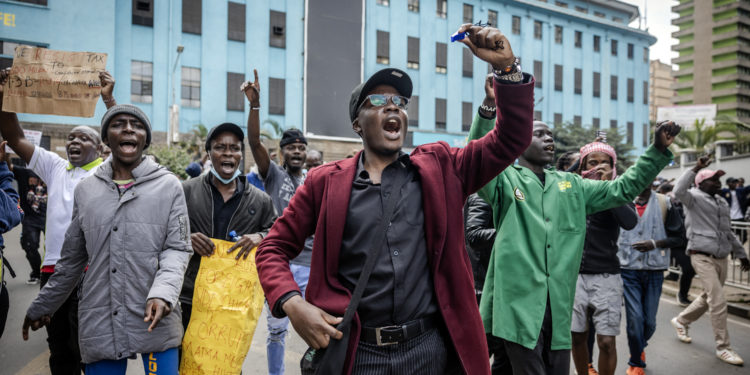They are digital natives who have never known a world without the internet and smartphones. As members of Gen Z come of age across Kenya, a groundswell of tech-savvy activism is upending the nation’s political landscape. Armed with coding skills and an instinctive fluency with social media, these young Kenyans are circumventing traditional power structures to demand accountability, transparency, and reform like never before.
The flashpoint was the proposed Finance Bill 2024, which threatened to introduce punitive new taxes on a range of goods and services. When details of the bill began circulating online, outrage swiftly coalesced on platforms like TikTok, which has emerged as an unlikely hub for news consumption and civic debate among Kenyan youth.
According to a recent Reuters report, Kenya ranks second globally for the percentage of its citizens using TikTok to access news content. One video skewering the Finance Bill 2024 from popular TikTok creator “Nowell” racked over a million views on his account alone, catalyzing a youth-led movement that would bring tentative amendments to the controversial legislation.
Incensed by the Finance Bill’s complex legalese, Ndemo took matters into his own hands. He built a custom language model — a cutting-edge form of artificial intelligence that can understand and generate human-like text — and trained it to digest and summarize the bill’s dense text.
As protests gained steam, Ndemo’s AI model proved a potent tool for demystifying the bill’s contents and rallying opposition on issues from income tax hikes to new levies on mobile data. He has since updated the AI with the 300-page report from Parliament’s Finance and National Planning Committee, allowing Kenyans to easily parse its findings and recommendations.
“Knowledge is power, but that power has traditionally been concentrated among elite analysts, bureaucrats, and politicians,” a user noted on social media. “Now, AI is democratizing access to complex information. We’re arming everyday citizens to engage as peers rather than be talked down to.”
A similar grassroots AI initiative is underway ahead of Kenya’s next general election in 2027. With memories still fresh of divisive clashes and irregularities that marred the previous polls, a collective of tech activists has vowed to take electioneering into their own hands.
Mwangi Kabiru is customizing an AI model to exhaustively study official Hansard transcripts from parliamentary proceedings dating back to September 2022. The aim: enabling voters to easily fact-check candidates’ stated positions, utterances and voting records on key issues.
Alongside scrutinizing incumbents, a separate group is already designing a “digital, citizen-led tallying center” for 2027. Leveraging encrypted data streams and blockchains, they envision a parallel, transparent vote-counting system to cross-check official tallies and rapidly detect irregularities or manipulation.
But Gen Z’s zeal for accountability runs deeper than just elections. A nascent movement is also coalescing to recall non-performing or corrupt members of parliament before their terms expire.
An open-source GitHub project by X user Oaksupreme is in the works to create an online platform for digitally verifying voters’ identities and automating the collection of recall petition signatures. By cross-checking records from authorities like the Independent Electoral and Boundaries Commission (IEBC), the system would aim to expedite and secure a process that currently relies on cumbersome manual processes ripe for rigging.
“The only way to return sense and accountability to our democracy is to exercise our right to recall these MPs and Women Reps. Their arrogance is too much,” noted Soko Analyst.
Kavengi, a data analyst by profession, has already prototyped an AI model to scrutinize planned healthcare reforms.
Kavengi’s initiative analyzes the Social Health Insurance Fund (SHIF) legislation set to roll out in July 2024. Her model digests the policy document and automatically surfaces key details like premiums, covered benefits, and enrolment guidelines that citizens can easily reference.
Beyond studying official texts, Gen Z’s techies have signaled their willingness to embrace more confrontational tactics against perceived injustice or obstruction. Seasoned social media sleuths have begun “doxing” – leaking personal information and records – on officials they accuse of graft or misconduct.
“Young people have decided to become fearless,” warns one anonymous Gen Z activist. “If you stand in the way of progress, we’ll go to the extent of tainting your name, leaking your phone numbers, exposing your family, spamming your businesses, and really making your life miserable until change happens.”
Whether such militant approaches gain wider acceptance remains to be seen. But what’s undeniable is Gen Z’s rising disillusionment with institutional inertia and its impatience to activate tangible reforms.
“Bravo to the Kenyan Gen-Z and millennials for reclaiming our country and showing the looting, cruel and reckless power barons that real power belongs to the people. Keep using the social media robustly. Do not retreat. Keep pushing and resisting until the final victory,” lawyer Miguna Miguna shared on social media.
From AI-powered policy clustering to crowdsourced election monitoring, technologically-supercharged civic participation is redefining Kenya’s political battlegrounds. A sleeping giant has awoken, fusing its coding prowess with activist zeal.
As Gen Z finds its voice on online platforms, the aging elite would be wise to listen. Because what’s unfolding isn’t just a youthful rebellion – it’s the birth of a new democratic vanguard.

















